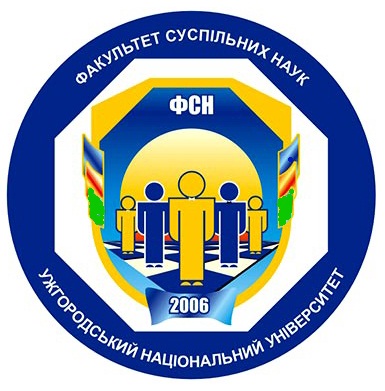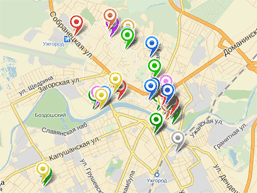Faculty of Social Sciences
The Faculty was created in accordance with the decision of the Scientific Council of Uzhhorod National University (on January 26, 2006) by the order of the Rector of UzhNU Mykola Vegesh on February 6, 2006.
The following words are indicated in the order: “On March 1, 2006, on the basis of the Law Faculty, the Faculty of History and the Departments of Pedagogics and Psychology, a new Faculty of Social Sciences consisting of Department of Political Science, Department of Philosophy, Department of Social Work, Department of Pedagogics and Psychology shall be established ”. Assistant Professor V. Keretsman was appointed the Dean of the Faculty. In 2007 Assistant Professor Yu.Ostapets was elected the Dean of the Faculty.
On September 1, 2013 the faculty structure was essentially changed and is as follows:
- Department of Political Science and Public Administration (Head - Doctor of Political Sciences, Professor M.Lendiel). The department has a long history. Being established in 1964 as a Department of Scientific Communism it was renamed several times: the Department of Scientific Socialism Theory (1989); the Department of Political Science (1991); and the Department of Political Science and Public Administration (2013).
In different years the Department was headed by Associate Professor V. Bodnar, PhD. M. Vegesh, PhD Yu. Ostapets and PhD. M. Lendiel (since 2013). The Department trains specialists in Political Science and Public Administration.
- The Department of Sociology and Social Work (Head - Doctor of Pedagogical Sciences, Professor I. Kozubovska). The Department was established as the Department of Social Work (1996) and made its first set of students specializing in “Social Work”.
- The Department of Psychology (Head - Candidate of Psychological Sciences, Associate Professor U. Mykhailyshyn). The Department was established in 1956 as the Department of Pedagogics, but in 1968 it was reorganized into the Department of Pedagogics and Psychology. The Department changed its name several times. On its basis two separate structures - the Department of Pedagogics and Psychology and the Department of Psychology were established in 2013. The Department trains specialists in Psychology and Applied Psychology.
- The Department of Philosophy (Head - Candidate of Philosophy, Associate Professor V. Hvozdyak).The Department of Philosophy was established in September 1949 as the Department of Dialectical and Historical Materialism and later it was renamed into the Department of Philosophy. The Department was headed by M. Redko (the first Head), V. Lendiel (1971), M. Bletskan (1985). Since 2005 V. Hvozdyak has become the Head of the Department. The Department provides courses in Philosophy, Logic, History, Philosophy, Culture, Ethics Aesthetics and Religion Studies.
The Lecturers of the Faculty are engaged into the Social and Psychological Service Activities of Uzhhorod National University, which has the following structure:
- The Center for Psychological Aid;
- The Center of Sociological Research;
- The Transcarpathian Regional Centre for Gender Education.
The Faculty employs 80 teachers, including 7 professors, 41 Associate Professors, 14 senior lecturers and 18 teachers. The faculty has got more than 760 full-time and distance learning students.
The best graduates have the opportunity to study at post-graduate school in the following specialties:
- 23.00.02 - Political Institutions and Processes;
- 22.00.03 - Social Structures and Social Relations;
The post-graduate students and PhD applicants have passed one Doctor’s Thesis and 26 Master’s Theses. The students have the opportunity to publish the results of their research in the Scientific Bulletin of the Faculty “Social and Politics Society”
The Emblem of the Faculty, designed by the Professor of Sociology and Social Work A. Palin, was approved at the meeting of the Academic Council of the Faculty in April 27, 2007.
The meaning of the symbols. A polygon in the circle symbolizes eternal knowledge of the world (M. Cusansky). The Shield is a sign of protection. A blue Ribbon with the number 2006 means the date of the Faculty establishment. A blue and yellow chessboard is a symbol of the geopolitical model of the world in dynamic development (proposed by Z. Brzezinski). 5 symbolized human figures mean the society involved in the geopolitical game.The Flags of blue, red and green colours are the “working group” colours is the sign of fruitful cooperation of teachers and students.
Nowadays, the Faculty has provided the training of the following future professionals:
- “Sociology”. Graduates receive the qualification of “Bachelor of Sociology” (6.030101)
- “Social Work”. Graduates receive the qualification of “Bachelor of Social Work” (6.130102), “Social Work Specialist” (7 13010201), “Master of Social Work” (8 13010201)
- “Political Science” Graduates receive the qualification of “Bachelor of Political Science” (6.030104), “Political Scientist. Lecturer of Social Sciences” (7 03010401) and “Master of Political Science. Lecturer of Social Sciences” (8 03010401)
- “Psychology” . Graduates receive the qualification of “Bachelor of Psychology” (6.030102)
- “Practical Psychology” Graduates receive the qualification of “Bachelor of Applied Psychology” (6.030103) and “Practical Psychologist” (7.03010301)
- “Civil Service” Graduates receive a specialty “Master of the Civil Service” (815010005).
The Faculty collaborates with National University “Kyiv-Mohyla Academy”, Kyiv National University, Lviv National University, Chernivtsi National University, Ivano-Frankivsk National University, Dnipropetrovsk National University, Donetsk National University; Institute of History of Ukraine, Institute of Political and Ethnic Studies of NAS of Ukraine, Ternopil National Pedagogical University; University of Cluj-Napoca (Romania), University of Lodz (Poland), University of Dundee (Scotland), Institute of Social Work of Brussels and Institute of Namur (Belgium), University of Szeged and Niredhaza Pedagogical Institute (Hungary), Institute of Ethnic Studies of the Hungarian Academy of Sciences, University of Prešov (Slovakia) and other higher educational institutions.
The faculty successfully combines its scientific work with education and entertainment. The students of the faculty are actively involved in a number of training and competitive-holiday events such as “Faculty Day”, “Freshman Day”, “Student’s Day” and others. The faculty initiated such holidays as “Student’s Taste, “Psychologist’s Day”, “Social Worker’s Day.”
R.Zholtani
10.11.2014









